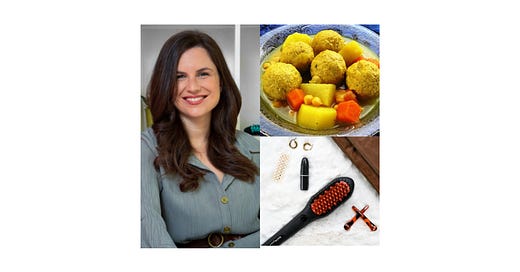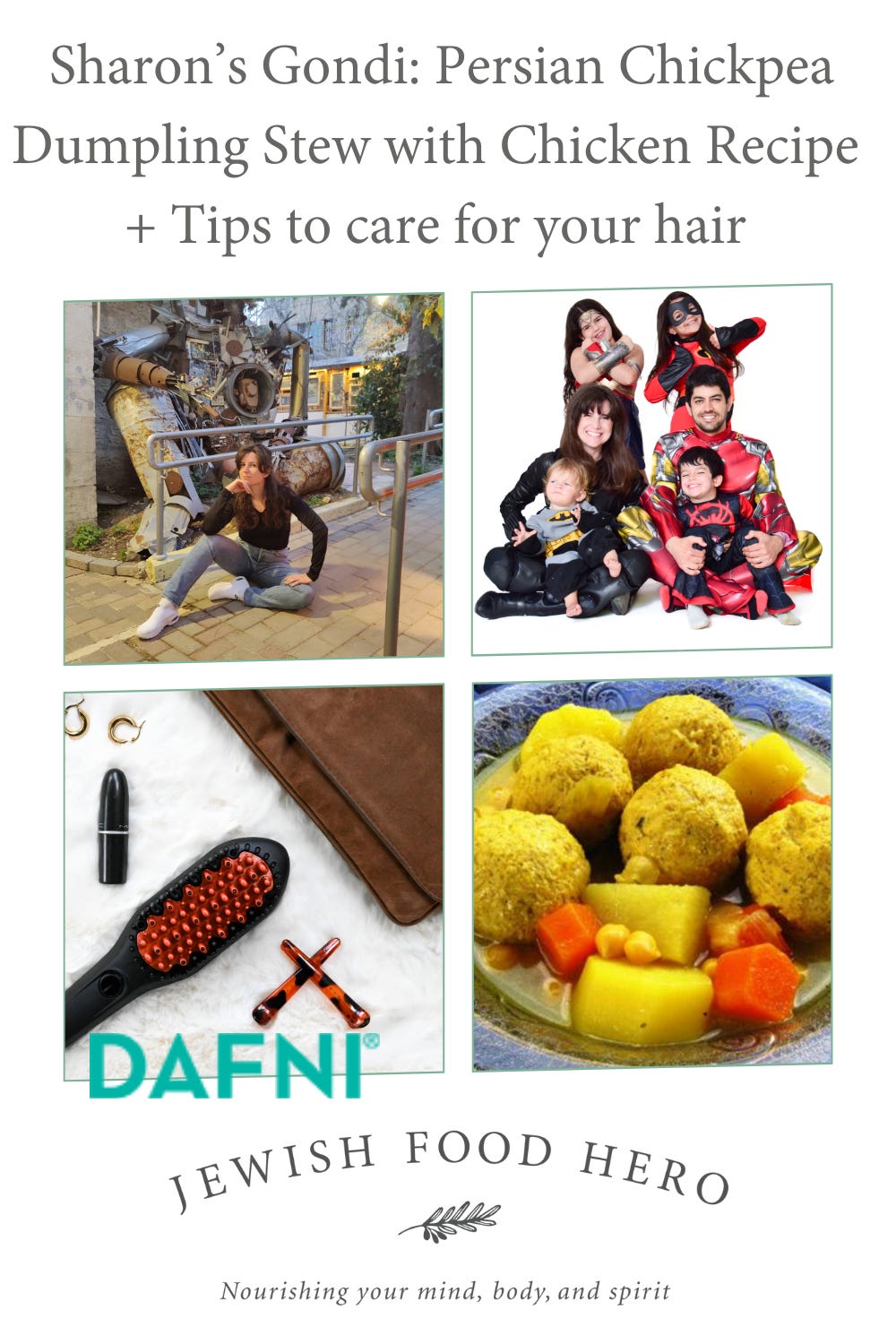Sharon’s Gondi: Persian Chickpea Dumpling Stew with Chicken Recipe
Hair Tips from Israel 🇮🇱.
A few weeks ago, I found myself in a bit of a panic over my daughter's hair. At 14.5 years old, she's naturally becoming more interested in her appearance—her clothes, skincare, makeup, and styling her hair. While I fully support her self-expression, I also want her to care for herself without causing harm, especially as I've noticed damage from hair straightening over the past year. So, during my usual early morning routine, I began searching online for a gentler hair tool, one that would help her achieve the look she wants without further damaging her hair.
After some research, I came across the Dafni Hair Smoother—a brush-shaped device from Israel which uses ceramic heating technology to straighten hair efficiently. It's been a game-changer for us! It’s so much quicker than other tools we’ve tried. There is no clamping or pulling involved, and you don’t get that feeling of cooking your hair between flat irons. As my daughter has naturally curly hair, this is all really important for minimizing damage. Living in France, where the Dafni wasn't readily available, I reached out directly to Dafni and ordered one for her. The results were immediate and impressive, as she excitedly shared a video on Snapchat.
I also bought the Dafni in my quest to support Israeli products amidst the BDS movement, The BDS (Boycott, Divestment, Sanctions) movement, launched 2005, aims to pressure Israel through economic and cultural boycotts. It has garnered significant global attention and controversy, criticizing Israel's policies towards Palestinians and advocating for their rights. However, the movement is ineffective and has a negative impact on both Israelis and Palestinians.
BDS hinders opportunities for cooperation and peacebuilding between Israelis and Palestinians, exacerbating tensions rather than fostering constructive dialogue. It has provoked defensive responses from Israel, heightened polarization, and undermined efforts towards mutual recognition and reconciliation. Additionally, BDS oversimplifies the complexities of the Israeli-Palestinian conflict and employs tactics that may harm the Palestinian economy more than achieving meaningful political change. BDS is not a strategy for promoting justice and peace in the region.
I also connected with Sharon Rabi, the founder of Dafni. We discussed her journey with Dafni and, of course, her mother-in-law's cherished Gondi recipe. I hope you enjoy hearing her story as much as I did.
Can you please introduce yourself to our readers? Share a bit about your background, interests, and what you're currently involved in.
I’m a 36 year-old engineer, physicist, mom of four and the co-inventor of DAFNI.
I am a secular Jew and my husband came from a religious family, so we met in the middle. My parents in law are very religious and we are very close. I love that our kids are exposed to different shades of Judaism.
I exercise but I am not a big sports fan... I guess my son’s basketball is my favorite sport!
Can you share with us how the war has impacted your family and what it's like to be a military wife?
I met my husband in the army 16 years ago and he is still active in reserve, especially since 10/7.
In the first few weeks I stayed at my mom’s with my kids. I think that when we will look back in a few years we won’t understand how we did it, but we didn’t have a choice so we did our best. The kids studied on Zoom (because schools were closed for a few good months) and I worked whenever I could.
I want to say the stories vary but we are all going through something very intense these days. While I absolutely wish we never had to get here, I feel so very proud of our men and women. Staying home alone with kids is always hard, staying home alone with kids while under a rocket attack is harder. And yet we are the lucky ones.
You’ve built a successful beauty business. What is your ‘beauty philsophy’?
I don’t think there is anything superficial about wanting to look your best. Whether we acknowledge it or not, we all spend time thinking about our appearance. I think you want to find the right amount of investment in your appearance, to me personally that means that I want to be empowered by how I invest in my appearance. I work out, I style my hair and I will often wear light makeup like a bb cream, some blush and a mascara. I personally believe in avoiding damaging beauty treatments such as chemicals.
I believe in self acceptance, and more than anything else I believe in doing your best and forgiving yourself when you change your beliefs or at times in your life you don’t live up to your own expectations. It’s a (beautiful) journey.
Career Path
Could you tell us the story of Dafani?
When I was a student I had a really really short haircut and I started using straighteners for the first time in my life. I actually studied engineering and physics and I was the only girl in my class. Prior to having that haircut I had never used any hair tools. I couldn’t believe it took so long to style hair!
I discovered the hair straightener was already patented in 1909(!) back when women weren’t allowed to vote or own a bank account. It became clear to me that to feel confident with my hair I needed to spend hours a week with a straightener. I realized I had now joined the secret club of women spending hours styling every week. I wanted a more efficient tool and, not being able to find one, decided to set to work designing one!
I spent three years co-developing the Dafni brush with my father, an Israeli hi-tech veteran. When we launched the brush I made a demo video and it reached 120 million views. We are grateful to have almost 1 million customers around the world.
As someone who has been thinking and working on hair since 2012, can you share your best tips for taking care of our hair, both from the inside out?
I have several!
Shampoo your hair twice every time you wash it. For best results, wash your hair twice a week. A clean scalp is the foundation of a lasting hairstyle. Ensure your shampoo is suitable for your scalp type, as scalp care is skin care.
Avoid applying hair masks or conditioners to the roots.
Rinse thoroughly with cooler water to close the hair cuticles.
Be mindful of hygral fatigue: When hair absorbs water, it swells. If your hair stays soaked for too long or if you frequently wet and dry it, this repeated swelling and shrinking can weaken your hair, making it more prone to breakage, frizz, and damage. To prevent hygral fatigue, avoid leaving your hair wet for extended periods. After washing, dry your hair thoroughly with a microfiber towel, and use a hair dryer on a low heat setting to ensure it is completely dry. This helps maintain the strength and health of your hair.
Dry your hair properly. Use a microfiber towel to gently dry your hair, then use a hair dryer on a lower heat setting.
Style your hair with a balance of heat and tension. It’s important not to use too much of either. Avoid using temperatures above 200°C, as they are too hot for all hair types.
What has it been like as a female leader of a successful business?
Women in leadership is a soft spot. In context, women only started getting out of the house less than a century ago. To start a business and to grow it you need funding, most of the investors are men and we all tend to connect with people who are similar to us, so the landscape is still very challenging for us women. At the same time, there are remarkable stories to learn from that show we can succeed.
Gondi Recipe history
I dedicate this recipe to my mother-in-law, who cooks for our family. She is my lifesaver! Can you imagine having four kids, a business and a husband in reserve without help? I can’t. This dish is my children’s favorite. It’s made of Hummus and Chicken and should be served on white rice. This dish, consisting of chickpea and meat dumplings, holds significant cultural value and is often served during special occasions and Sabbath meals.
Gondi, also known as Gundi, is a traditional Persian Jewish dish originating from the Jewish communities in Iran (where my father-in-law was born), particularly Tehran.The Jewish community has been part of Persian society for over 2,700 years, and their culinary traditions, shaped by kashrut dietary laws, have mingled with Persian cuisine to create unique dishes like Gondi. The exact origins of Gondi are unclear, but it likely developed as a nutritious and flavorful dish using common ingredients such as ground chickpeas, chicken or lamb, onions, and a blend of spices like turmeric, cumin, cardamom, and black pepper. These ingredients are formed into dumplings and simmered in a rich broth, often made from chicken or beef bones. Over time, Gondi has evolved with various regional and familial adaptations, incorporating different herbs and spices. It’s still a cherished dish within Persian Jewish households and has gained broader popularity, symbolizing cultural heritage and the rich culinary traditions of the Persian Jewish community.
Persian Gondi Recipe
Ingredients:
For the dumplings:
500g (1.1 lbs) ground chicken breast
3 medium onions, grated (include the liquids)
¾ cup canola oil
1 heaping tablespoon black pepper
1 ½ tablespoons salt
1 teaspoon turmeric
1 flat teaspoon ground cardamom
500g chickpea flour (approximately - add gradually until the mix reaches the right consistency)
For the soup:
2 liters water
4 chicken legs
2 tablespoons soup powder or bouillon, or 2 stock cubes
½ teaspoon turmeric
2-3 dried limes (Persian lemons)
Instructions:
For the dumplings:
In a large bowl, mix together the ground chicken, grated onions (with their liquid), canola oil, black pepper, salt, turmeric, and ground cardamom.
Gradually add the chickpea flour, kneading until the mixture forms a soft, pliable dough that doesn't stick to your hands. Add a bit of water if necessary to achieve the right consistency.
For the soup:
In a large pot, combine the water, chicken legs, soup powder or bouillon, turmeric, and dried limes.
Bring the mixture to a boil.
Cooking the Gondi:
When the chicken legs are almost cooked, form balls from the dough and add them to the pot while the soup is still boiling.
Cook for about half an hour, or until the gondi (dough balls) are fully cooked.
Serve the soup and gondi over white rice.
I hope that you enjoyed meeting Sharon! Here is the link to buy your DAFNI - it’s good for your hair 💇and good for Israel 🇮🇱.
Am Yisrael Chai🕊️.
Kenden












Do you buy a specific chickpea flour or just make it yourself?